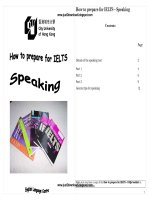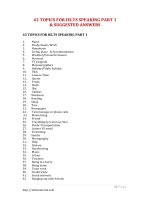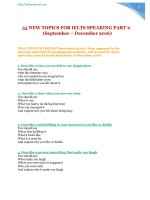Fluency for ielts speaking
Bạn đang xem bản rút gọn của tài liệu. Xem và tải ngay bản đầy đủ của tài liệu tại đây (15.95 MB, 58 trang )
FLUENCY
for
IELTS
SPEAKING
©
/>
INTRODUCTION
This course is an intense workout to improve your fluency in the IELTS Speaking test.
It will help you,
•
•
•
Speak more fluently
Improve your intonation
Build your confidence
The course is divided into three parts, like the IELTS Speaking Test.
The focus is on
• Learning to use ‘chunks’ flexibly
• Building coherence
• Using grammar effectively and effortlessly
It follows a grammar-based curriculum.
The course also uses a ‘question - answer’ format, so you can see how to use different
tenses effectively in different parts of the test.
1
©
/>
TABLE OF CONTENTS
Fluency in Part 1 Questions
Talking about yourself and your experience, past and present.
• Present Simple
• Present Perfect Continuous (past to present activity)
• Present Perfect Continuous (recent activity)
• Past habits (simple past, used to, would)
• Present Perfect (experiences)
• Comparatives
• Superlatives
• 2nd Conditional
Fluency for Part 2 Questions
Giving a talk about people, places, things, activities and events that may have
happened in the past, present or future.
• Simple Past
• Past Continuous
• Past Perfect
ã Relative Clauses
ã 3rd Conditional
2
â
/>
Fluency for Part 3 Questions
Giving your opinions, evaluations and speculations of more abstract topics, as
well as exemplifying and justifying your ideas.
IE
LT
S
M
a
tt
e
rs
.c
o
m
• Future - will / might / may
• 1st Conditional
• Present Perfect (result in present)
3
©
/>
HOW TO USE THIS GUIDE
Read the introductory grammar point.
Watch the video.
When you hear an answer,
• Listen and repeat
• Listen to the intonation, and then repeat
• Finally, repeat the whole answer
• Where possible substitutes are given, repeat the answer again, and change the
underlined phrase
• Finally, say an answer that is actually true for you.
For example, in unit 1, for the question “Do you run?”. If you run everyday, you could say,
‘As a matter of fact I do. I’m really into running. I run everyday’
When practicing speaking, I strongly recommend you work with either the audio (or
video) without looking at the PDF.
4
©
/>
PART 1
Fluency for Part 1 Questions
©
/>
UNIT 1
Present Simple
If you are talking about things that are true now, or your habits or things that happen
regularly, you can use the present simple tense.
I / you / we / they + verb
• I live in Spain
• I work as a teacher
• I do like this music (use ‘do’ for emphasis)
NEGATIVE - I / you / we / they + DON’T + verb
• I don’t live in Spain anymore
• I don’t like this music
He / she / it + verb + S
• He lives in England
• My sister works in a hospital
• She does like her job (use ‘does’ for emphasis)
NEGATIVE - He / she / it + DOESN’T + verb
• He doesn’t live in England now
• My sister doesn’t like her job
6
©
/>
Part 1 Questions
Q: Do you like reading?
A:
Yes I am big fan of reading.
I’m really into crime novels actually,
I do like Agatha Christie
Possible substitutes for crime novels:
Thrillers / biographies / romance novels
7
©
/>
Q: Do you like reading?
A:
Not much
It’s not really my cup of tea
I tend to listen to music
whenever I have any free time
Possible substitutes for any free time:
Time on my hands / a spare moment / time to kill
Q: Do you often run?
A:
As a matter of fact I do
I’m really into running
I run twice a week
Possible substitutes for twice a week:
most days / regularly / on a regular basis
= a lot
once in a while / now and then / now and again = sometimes
8
©
/>
Q: Do you cook?
A:
Yes I do,
I’m rather fond of cooking,
to tell you the truth.
I find it really relaxing.
Possible substitutes for relaxing:
Calming / exciting / therapeutic (=relaxing)
Q: Do you play water sports?
A:
Not really to be honest,
I don’t play any water sports.
I don’t have much chance
where I live
9
©
/>
UNIT 2
Present Perfect Continuous
(activity from past to present)
If you are describing events or states that began in the past, and continue now, you can
use the present perfect continuous
Subject + have/has been + verb+ING
• I have been living here for 2 years
• I have been studying English for 10 years
We use for to indicate a period of time
For example:
2 years, one day, 3 weeks.
We use since to indicate a point in time
For example: last year, yesterday, last Tuesday
10
©
/>
m
o
.c
rs
a
tt
e
Q: Do you run?
A:
IE
LT
I do as a matter of fact,
I’ve been jogging
for about 3 years now.
I love it.......
S
M
Part 1 Questions
Possible substitutes for 3 years:
3 months / a good while / as long as I can remember
11
©
/>
Q: Do you practice any water sports?
A:
Yes, I do.
I surf actually.
I’ve been surfing
since I was a kid
Possible substitutes for surf:
swim / water-ski / snorkel
Q: Do you drive?
A:
Yes, I do.
I’ve been driving
since I was 18
I usually drive to work everyday
Possible substitutes for was 18:
turned 18 / was a teenager / passed my driving test
12
©
/>
UNIT 3
Present Perfect Continuous
(recent activity)
We can also use the present perfect continuous to describe repeated activities that began
in the past and still continue
Subject + have/ has been + verb+ING
Recently I have been watching a good TV series
Lately, I have been going to the gym a lot
She has been working out down the gym a lot lately
When speaking, we often contract the “have” and “has”
Recently I’ve been watching a good TV series
Lately, I’ve been going to the gym a lot
She’s been working out down the gym a lot lately
13
©
/>
Part 1 Questions
Q: Do you cook?
A:
Yeah, I love cooking.
Recently,
I’ve been learning
some new Japanese recipes.
Possible substitutes for new Japanese recipes:
New dishes / new recipes / original ideas for new dishes
14
©
/>
Q: Do you cook?
A:
No, not really
That said, I’ve been trying to learn
following some videos on Youtube
Possible substitutes for some videos on Youtube:
A new book I have / a programme on TV / some online classes
Q: Are you interested in science?
A:
Yes, I am a big fan of science.
Recently,
I’ve been listening
to a new podcast about science
Possible substitutes for science:
Biology / the planet earth / scientific issues
15
©
/>
Q: How do you spend time by yourself?
A:
Well, actually, recently,
I’ve been learning how to meditate.
It’s great fun, I must say
Possible substitutes for meditate:
Keep fit / paint / code /
16
©
/>
UNIT 4
Past Habits
We can use,
• SIMPLE PAST TENSE
• USED TO
• WOULD
to describe habits we had, or activities we repeatedly did in the past
SIMPLE PAST TENSE
Subj + verb+ED (regular)
• I walked a lot when I was young
• I didn’t walk a lot when I was young
Subj + verb in past (irregular)
• I swam a lot when I was young
• I didn’t swim a lot when I was young
17
©
/>
USED TO
Subj + used to + verb
• I used to swim a lot in my childhood
• I didn’t used to swim a lot in my childhood
WOULD
Subj + would + verb
• I would swim a lot as a child
• I wouldn’t swim a lot as a child
18
©
/>
Part 1 Questions
Q: Did you eat a lot of sweet things when you were younger?
A:
Yes, I did, to be honest
In my family
we would have a dessert
after dinner most days.
Possible substitutes for a dessert:
some kind of cake / something sweet / some kind of dessert
19
©
/>
Q: Did you do water sports as a child?
A:
Yes, I did.
I used to swim a lot.
Most weekends actually.
Possible substitutes for Most weekends actually.
at least twice a week / most days, as a matter of fact / whenever
I could
Q: Did you take art classes when you were a child?
A:
Yes, I had to do art classes at school,
it was mandatory, you know
Possible substitutes for do
Take / go to / take part in
20
©
/>
Q: Did you enjoy learning English when you were a child?
A:
Not really, I didn’t like it much.
I often used to skip English classes,
to tell you the truth.
Possible substitutes for to tell you the truth:
To be honest / if the truth be told / to be honest with you
21
©
/>
UNIT 5
Present Perfect (experiences)
We can use the present perfect to describe experiences we have had in life
Subj + have/has + past participle
• I have been to Paris
When speaking, we usually make the contraction - I have becomes I’ve
• I’ve been to Paris
• I’ve run a marathon
• I’ve never seen a lion
If we continue to talk about this experience, the following sentences usually use the simple
past tense.
I’ve run a marathon once. It was 2 years ago and took place in Australia.
22
©
/>
Part 1 Questions
Q: Have you ever grown a plant?
A:
Actually, no I haven’t.
I’ve never learnt how to do it
but I’d love to try
Q: Have you ever been to an art gallery?
A:
Oh yes. I have been to a few actually.
I went to a great one in Italy last year,
it had some famous masterpieces,
that were really impressive.
23
©
/>





